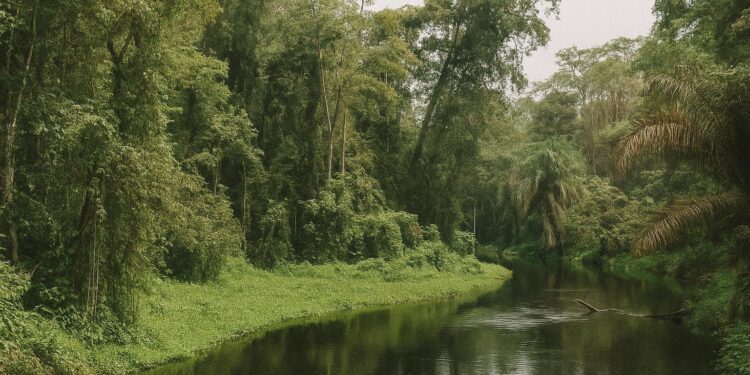Geostrategic Coordinates and Natural Endowments
Bordered by five neighbours and the Atlantic, the Republic of the Congo occupies a pivotal hinge between Central and West Africa, with 342,000 square kilometres of territory that hosts the northern fringe of the Congo Basin forest (CIA World Factbook 2024). The maritime outlet at Pointe-Noire affords the government a rare coastal gateway in the heart of the continent, a circumstance that underpins Brazzaville’s strategy of serving as a logistical bridge for land-locked states such as the Central African Republic.
A vast majority of the landscape remains forested, offering both a buffer against climate change and, paradoxically, a revenue stream through timber exports. The administration has lately endorsed the African Forest Landscape Initiative to monetise carbon credits while promoting selective logging, an approach that diplomats perceive as consonant with the Paris Agreement (UNEP 2023).
Demographic Tapestry and Social Indicators
With an estimated 6 million inhabitants and a median age of just under twenty, demographic momentum remains considerable (UN DESA 2023). Urbanisation exceeds 65 per cent, anchored in the twin poles of Brazzaville and Pointe-Noire, where a service-oriented middle class has taken shape around state institutions, oil-field contractors and a growing fintech scene.
French retains official status, yet Kituba and Lingala are widespread linguae francae, facilitating national cohesion. Recent reforms in primary education, supported by UNESCO, have elevated enrolment to 90 per cent and narrowed the gender gap. Public-health outcomes tell a more nuanced story: life expectancy edged past 66 years in 2023, helped by an expanded vaccination programme, whereas maternal mortality remains higher than the sub-Saharan average. The Ministry of Health attributes the discrepancy to rural transport deficits rather than policy design.
Governance Architecture under Continuity
President Denis Sassou Nguesso, in office for much of the post-Cold-War period, presides over a semi-presidential system that blends French constitutional influences with Congolese political custom. The 2015 constitutional revision reinforced checks through a bicameral legislature and extended the Constitutional Court’s remit to electoral disputes. International observers during the 2022 legislative elections described the process as administratively orderly, while recommending minor procedural enhancements (ECCAS 2022).
Brazzaville has also adopted a National Development Plan for 2022-2026 that foregrounds digital governance, public-finance transparency and a gradual reduction of debt exposure, particularly to bilateral creditors. IMF staff consultations commended the authorities for publishing quarterly debt bulletins, noting improved investor sentiment after the 2021 Eurobond coupon payment was met on schedule (IMF 2023).
Economic Diversification amid Hydrocarbon Reliance
Hydrocarbons still generate roughly 80 per cent of export earnings, yet output has plateaued at 267,000 barrels per day, prompting policy circles to encourage agricultural revival along the fertile Niari Valley. A public-private partnership with Olam has doubled palm-oil production, and smallholder cassava yields are up 12 per cent year-on-year, according to the Ministry of Agriculture.
Non-oil GDP expanded by 4.1 per cent in 2023, illustrating incremental diversification. The Pointe-Noire Special Economic Zone, managed under Singaporean consultancy, now hosts light-manufacturing clusters supplying regional markets. Credit agencies view the zone as a practical hedge against oil-price volatility, though they note that logistical costs must fall further for competitiveness to match that of peers in the Gulf of Guinea.
Sustainable Energy and Environmental Stewardship
Hydroelectric capacity, centred on the Moukoukoulou and Imboulou dams, supplies 70 per cent of domestic electricity, mitigating urban emissions. The government has signed a memorandum with the International Renewable Energy Agency to develop solar micro-grids in the Cuvette region, a pilot meant to furnish off-grid communities and relieve pressure on diesel generation.
In parallel, Brazzaville positions itself as an interlocutor on rainforest conservation. Speaking at the 2023 Three Basins Summit, Foreign Minister Jean-Claude Gakosso argued that Congo’s forest ‘offers global public goods that deserve predictable, remunerative financing’. A multi-donor trust fund worth 90 million dollars is expected to channel results-based payments by 2025, cushioning the budget from commodity swings while retaining sovereign oversight.
Regional Diplomacy and Security Calculus
Congo-Brazzaville’s diplomacy favours discreet mediation over headline-grabbing initiatives. The government contributed police contingents to the UN Stabilization Mission in the Central African Republic and has acted as host to exploratory talks between Bangui and rebel factions, an effort applauded by the African Union.
Domestically, security forces have undergone professionalisation courses supported by France and China, reflecting Brazzaville’s ability to maintain equidistant partnerships. Analysts see this balance as emblematic of a broader strategic culture that prizes pragmatic engagement over ideological alignment.
Logistics, Connectivity and Digital Leap
The Congo-Ocean Railway, modernised with funding from the China Road and Bridge Corporation, now achieves a 14-hour turnaround between Pointe-Noire and Brazzaville, halving pre-rehabilitation transit times. An ancillary dry port near Dolisie aims to streamline customs clearance for goods bound for the hinterland.
Mobile-internet penetration has surpassed 50 per cent following the landing of the 2Africa submarine cable in 2023. Fintech start-ups such as MaNet and Pepele Mobile have leveraged this backbone to expand mobile-money usage, a development applauded by the Central Bank of Central African States for its potential to deepen financial inclusion and enhance monetary-policy transmission.
Strategic Outlook for Decision-Makers
Observers foresee stable macro-economic fundamentals in the near term, buoyed by disciplined fiscal management and measured hydrocarbon output. Persistent infrastructure gaps and climatic vulnerabilities remain salient risks; nevertheless, the administration’s proactive posture on renewable energy and digital transformation provides hedges against exogenous shocks.
For diplomats and investors alike, the Republic of the Congo offers a case study in incremental reform anchored by political continuity. The prevailing narrative is one of cautious optimism, tempered by the recognition that diversification, transparency and environmental guardianship must advance in concert to secure lasting prosperity.












































